Spain’s most dangerous neighborhood
Even the police rarely venture into El Príncipe in Ceuta, where poverty and drug violence rule
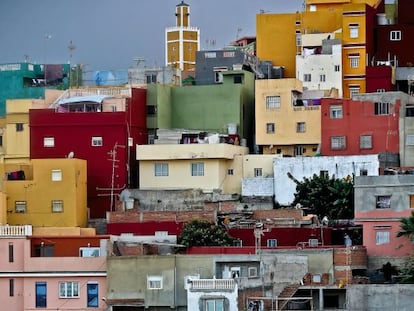
Few visitors to Ceuta, Spain’s exclave on Morocco’s Mediterranean coast, ever venture into the Príncipe Alfonso district. Home to the city’s poorest inhabitants (all of them Muslim), lacking the most basic amenities and crippled by 90-percent unemployment, it’s a third-world slum dominated by rival drug gangs fighting each other to control a trade that has moved away to Tangier. “It’s a pressure cooker that could blow at any time,” says a member of the Spanish security forces. “This is Spain, but it isn’t Spain. Quite simply, there is no law here, the state is absent.”
Outsiders are not welcome in el Príncipe, and neither are the police, who rarely enter, and whose duties are limited to mediating in domestic disputes. In any case, the area’s narrow streets and alleyways prevent cars from patrolling; there is no station house. Even ambulances and fire services only come in when protected by the Civil Guard. The neighborhood, which sprawls up a windswept, barren hillside known as Monte Chico, is Spain’s African outpost. Each day, tens of thousands of men and women head through the district to the Tarajal crossing, carrying goods to sell in Morocco. El Principe has also become a hiding place for undocumented migrants hoping to make it into Europe.
The hashish trade is a part of everyday life in el Príncipe, and one of the few ways to earn a living there: “It is the only industry in the north of Morocco; it provides the most jobs, and pumps the most money into the economy, and it also finances radical Islam,” says a Civil Guard officer. This year alone, four young men have been killed there in disputes that the police say are related to the drug trade.
Kids here don’t care about Batman, their heroes are the gunmen who drive big fast cars and live in huge houses” El Príncipe resident
Fátima, who prefers not to give her surname, is the mother of 35-year-old Mohamed Ennekra, who was shot and killed in August. “Mohamed had never been in trouble with the police; he earned a few euros each day making deliveries. How could he have been a drug trafficker? He was as poor as a rat,” says his mother.
“If the government had sorted this place out long ago, then we wouldn’t be here crying over Mohamed,” she continues. “All the decent people have left. The police haven’t even bothered to ask me about my son – how can we trust them?”
Mohamed’s sister, Saba, says her brother may just have been in the wrong place at the wrong time: “Here, you can die just because you know somebody who owes somebody else money. Before, disputes would be resolved with a fistfight, but the kids today sort things out with guns. And that is what happened to my brother.”
In el Príncipe, silence means survival, and nobody is willing to talk to strangers, least of all the police or security forces, who must rely on informants and what they can glean from intercepting emails or cellphone messages as they try to keep track of the drug traffickers. Although their attention these days is more focused on the threat from radical Islam, keen to recruit among the young men who see no future within a system that has turned its back on them.
“It’s easier to investigate the jihadists than the drug traffickers, because there is more international collaboration, and also because Morocco is very supportive: but we get no help in fighting drug traffickers, the Moroccan authorities look the other way,” says a senior Civil Guard officer. “But when it comes to fighting radical Islam, the information services can’t do enough for us. In Morocco, there are two things the police won’t overlook: attacks against the monarchy or jihadism.”
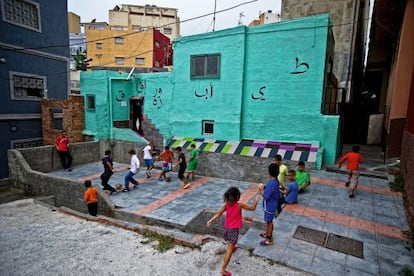
It’s not uncommon in el Príncipe to find spent cartridges in the dusty waste ground that rings the area. One resident says he saw a gang leader walking through the district a few weeks ago carrying a state-of-the-art HK machine pistol: “He was surrounded by young boys who cheered him as though he were Cristiano Ronaldo. Kids here don’t care about Batman, their heroes are the gunmen who drive big fast cars and live in huge houses. There are a lot of guns here: this is a garrison town; it’s harder to smuggle a kilogram of hashish out to Spain than to bring a weapon into Ceuta. There are no searches,” he says.
El Príncipe is, quite simply, a world apart from Spain, says Kamal Mohamed, head of the district’s residents association. “We live in an apartheid system. We are second-class citizens. We pay our taxes, but we don’t have the same rights or obligations as the rest of the city. And of course we don’t have the same opportunities: once an employer knows you’re from here, you can forget about a job. It may be difficult for outsiders to get in here, but for us, it is impossible to get out.”
Karim Mohamed, another resident, scrapes a living selling goods in Morocco. His parents moved here in the 1940s and built their own home – which they pay tax on despite having no ownership deeds. He says Ceuta’s administration has ignored the district for decades. “In the 1980s, nobody cared about the drug trafficking, which meant that for a couple of generations, young men got involved in the trade. They didn’t bother going to school or training for a job. They made a fortune smuggling drugs across the water. I guess the idea was that we would just all kill ourselves in drug wars. So what happened was that this place, which was always poor, but where people had worked, and where half of the residents were Christians, simply became a Muslim ghetto, with its own rules. The state just forgot about us. How many neighborhoods do you know in Spain where the police don’t dare set foot? Kids here have no idea about the outside world.”
The district has recently provided the setting for a hit crime series on Spanish television. “Now everybody in Spain thinks that we’re all terrorists and our women are prostitutes,” says one resident.
It’s easier to investigate the jihadists than the drug traffickers, because there is more international collaboration, and Morocco is supportive” A senior Civil Guard officer
But the reality of el Príncipe is far worse than the one shown to viewers in mainland Spain: the poverty here is nothing like that found anywhere else in the country, and dates back a century – the result of colonialism, a dictatorship, and finally a democracy that have all turned their back on the place. Residents say the only time they see their elected representatives is when they’re campaigning for election, when they come in with police protection. Come election time, the district overwhelmingly turns out for the ruling Popular Party (the PP runs Ceuta), explains Mohamed Mustafá Madani, a 28-year-old lawyer who has remained in Príncipe. “A lot of people vote for the PP, believing that if they don’t, then City Hall will cut off the subsidies it provides, which for most families here is half or all their income. Democracy never really took root here.”
As an outsider, it is only possible to walk through the streets of el Príncipe under the custody of trusted local people such as Isma Mohamed, a 30-year-old social worker. It soon becomes clear that most residents are, at best, distrustful of outsiders. The place is not urban, it seems to belong to the third world, like the favelas that climb up the hillsides of Rio de Janeiro: it’s a place nobody here wanted to end up, with a black economy, no schools, no public services, a place where nobody thinks beyond today.
“People who have nothing think only about their most immediate needs: they head out into the world in the morning with no other objective than to get through another day,” explains Emilio Díaz, a psychologist who works in el Príncipe. “There is no delayed gratification here, no aspiration to a better life, no saving money for the future. There is no point even studying to get a job. They do what they can, and they spend their money as soon as they get it. And the only successful role models the kids see are the criminals.
“The only way that will change is by waking people up, by helping them to find a way out,” he adds.
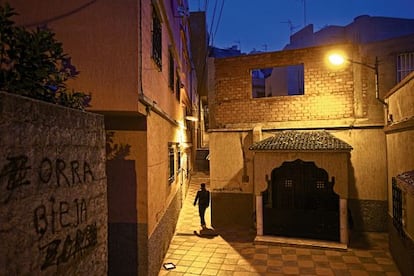
This is a place where few households have fridges, never mind food to put in them, where the roofs leak and the houses – ovens in summer and freezing cold on winter nights – sometimes just slide away down the hillside when it rains. It’s a place where families sleep on bare floors, and where parents have few options to provide food for their children: begging or stealing, if necessary. The main ways to earn money in el Príncipe are by smuggling tobacco, or by selling goods acquired in the Spanish part of the city in Morocco. There are occasional stories of hope, such as that of Dina, a girl whose relatives and extended family are helping her finish school. She lives with her mother, grandmother, and three younger brothers in a rat-infested ruin: ignored by the city’s social services.
The authorities in Ceuta are not even sure how many people live in el Príncipe: some sources say it could be 12,000, others 15,000, or maybe as many as 20,000. Estimates suggest that at least 3,000 people here have no papers, and so are unable to apply for any kind of government subsidy or get a permanent job. None of the houses here have planning permission. There is no work, and nobody goes to school, meaning that most residents are illiterate. There is no public transport – only two streets are wide enough to allow motor vehicles to pass.
This is a matriarchal society, although 80 percent of women are either unemployed or not even officially registered for employment. Many families have no income and survive on a €400-a-month subsidy paid by the local government. Paradoxically, the area has the highest birth rate in Spain. There are no shops or businesses, aside from a few food shops, cafés and barbers. There isn’t even a market, just boxes of fruit and vegetables placed on the sidewalk by elderly women on the main street.
There are no parks and hardly any street lighting in el Príncipe. After dark, its alleys and streets are deserted: few dare to go out, and anyway, there is nowhere to go. There’s no garbage collection either, and so trash is just left to pile up in the main Plaza del Padre Salvador Cervós, which is occasionally collected by city authorities. When it rains, the drains soon block, filling the streets with foul-smelling sewer water. Few people even speak Spanish, instead using a pidgin Arabic. Jorge Sillero, the head of the Juan Carlos I junior high school, says the few children who bother to attend never use Spanish: “Why would they? They never meet anybody from outside the neighborhood.”
It may be difficult for outsiders to get in here, but for us, it is impossible to get out” Kamal Mohamed, head of the district’s residents association
Life here is a vicious circle of poverty, drugs, and violence. Príncipe Alfonso’s problems began in the 1980s, by which time most of the Christian population had left for subsidized housing in the new suburbs on the outskirts of Ceuta. The city’s Muslim population, who until 1986 were denied the right to Spanish nationality, were unable to buy their homes or migrate to the mainland, and so remained trapped in ever-worsening living conditions.
Ceuta became Morocco’s cannabis capital. Each night, up to 50 motor boats would head across the Strait of Gibraltar carrying thousands of kilograms of hashish to Spain. The business was divided up between three capos: El Nene, Abdelhila and Tafo Sodía – who was murdered last year in the center of the city. El Nene is missing after supposedly being killed in an ambush this summer. The trade brought huge amounts of money into Ceuta and el Príncipe, resulting in the illegal building of hundreds of new homes. In 1986, around 15,000 Muslims from Ceuta were finally able to obtain Spanish nationality. Meanwhile, the money from drug smuggling continued to pour into el Príncipe.
Sitting in a café in central Ceuta, a former policeman describes the rise and fall of the city’s hashish economy: “It became a way of life, and the money even started to make it into the center of the city: these guys bought apartments, garages and taxis. They were using anybody they could find to help launder their money. In the 1990s, there were guys making four trips a night over to Málaga or Cádiz, earning €300 a kilo. But they got greedy, and started trafficking people as well, making €100,000 a night. So finally, the EU has to do something, and it built the SIVE, the vast network controling entry to Europe’s southern shoreline, hundreds of radars and cameras, and that put an end to the people trafficking, but also to the drug smuggling. The business moved up the coast to Tangier, and now the drugs are smuggled into Europe aboard containers.”
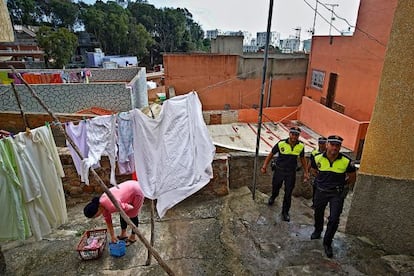
He says that when the drug money dried up, el Príncipe turned in on itself. “It was a disaster, because a lot of people relied on it for a living. And that’s where we are now, with shootouts, revenge killings, settlings of scores… They are fighting to the death to control a rapidly diminishing drugs market. Guys are calling in debts from years ago, when the place was awash with cash; they were stealing from each other, but it didn’t matter because there was so much to go round. But now the old grudges are coming to the surface. As well as the old timers, there are kids getting in on the act. They feel that they have nothing to lose, and they’re very dangerous. This is a deadly war for control of what is left of the drugs trade. There have been four killings this year so far, but the police aren’t the solution. Take it from me.”
But nobody in el Príncipe will talk about what happened, or who is behind the recent spate of killings. Questions that cross the line are simply ignored. Taking a photograph is out of the question: the women out of respect for their husbands, and the men because they don’t want to be associated with jihadism or drug trafficking, or because they are wanted by the police. Everybody seems to be spying on everybody else.
Walking up a narrow street, past a furniture repair workshop filled with bearded men, I suddenly notice Hamed Abderrahman Ahmed, alias Hamido, the only Spaniard held at Guantánamo Bay. During his 30-month detention he became a legend in el Príncipe, and his home a site of pilgrimage for some. He was somebody who had escaped from el Príncipe, who had gone abroad to wage jihad, and had now returned to tell the tale. For an instant he holds my gaze, and then disappears.
You can forget about sending in the army, like they did in Rio. That would set off a battle and many would die” Civil Guard secret agent
A Civil Guard secret agent says that for many years Madrid ignored reports from here about the growing radicalization of young Muslims. “They laughed at me,” he says. Until the attacks on Madrid in 2004, Spain’s security forces seemed uninterested in what was happening in Ceuta. “Since then, more resources have been put into combating radicalism within the Muslim community, but what we really need to do is to win the trust of the people who live in El Príncipe, and that means investing in improving their lives, not putting more police on the ground. And you can forget about sending in the army, like they did in Rio. That would set off a battle, and a lot of people would die,” he says.
The last decade has seen growing numbers of el Príncipe’s residents turn to Islam, in large part prompted by the economic crisis. Islamic organizations are able to help local people in ways that the city authorities cannot, or will not. Around 50 people have been arrested here on terrorism-related charges. But Laarbi Maateis, the city’s religious leader – he is head of the Ceuta Union of Islamic Communities, which controls 32 mosques throughout the city, as well as employing the 14 religious education teachers who provide classes on Islam to around 5,000 children – insists that there is no radicalism in el Príncipe: “Ceuta’s mosques are run by us, and we know what is going on in them, and they are not preaching jihad to their congregations,” he says.
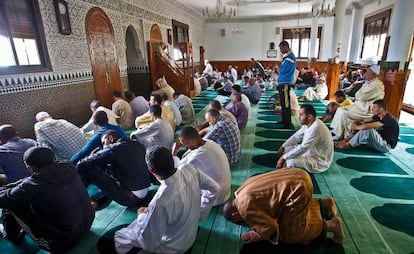
“I can say in all honesty that there is not a single extremist imam in the entire city. The Spanish state need not fear the way that Islam is being expressed in Ceuta, what it needs to do is help people here with their needs,” he says, adding that extremism is being fomented through the social networks rather than mosques. “This is happening in Paris, London, and Barcelona. Of course, poverty can feed extremism, and even more so when people feel like second-class citizens. Which is why it is so important to provide people with work, decent homes, and a decent place to live, where there is law and order. That’s the way to keep people out of trouble.”
There have been some improvements to the lives of the residents of el Príncipe: there is a hospital in a nearby neighborhood, along with some schools, and a multi-function building that houses job-training workshops and even a small office for the four municipal police officers whose day ends at 3pm. The Cruz Blanca, a religious charity respected in el Príncipe for its work, has also made a small but significant contribution, distributing food to families who are prepared to keep their children in school. Over the last five years, the city authorities have begun what might be called a sticking-plaster approach to addressing some of el Príncipe’s problems. “Between 2014 and 2020, around €20 million is going to be spent on urban regeneration there,” says a local government spokesman.
Tu suscripción se está usando en otro dispositivo
¿Quieres añadir otro usuario a tu suscripción?
Si continúas leyendo en este dispositivo, no se podrá leer en el otro.
FlechaTu suscripción se está usando en otro dispositivo y solo puedes acceder a EL PAÍS desde un dispositivo a la vez.
Si quieres compartir tu cuenta, cambia tu suscripción a la modalidad Premium, así podrás añadir otro usuario. Cada uno accederá con su propia cuenta de email, lo que os permitirá personalizar vuestra experiencia en EL PAÍS.
¿Tienes una suscripción de empresa? Accede aquí para contratar más cuentas.
En el caso de no saber quién está usando tu cuenta, te recomendamos cambiar tu contraseña aquí.
Si decides continuar compartiendo tu cuenta, este mensaje se mostrará en tu dispositivo y en el de la otra persona que está usando tu cuenta de forma indefinida, afectando a tu experiencia de lectura. Puedes consultar aquí los términos y condiciones de la suscripción digital.









































